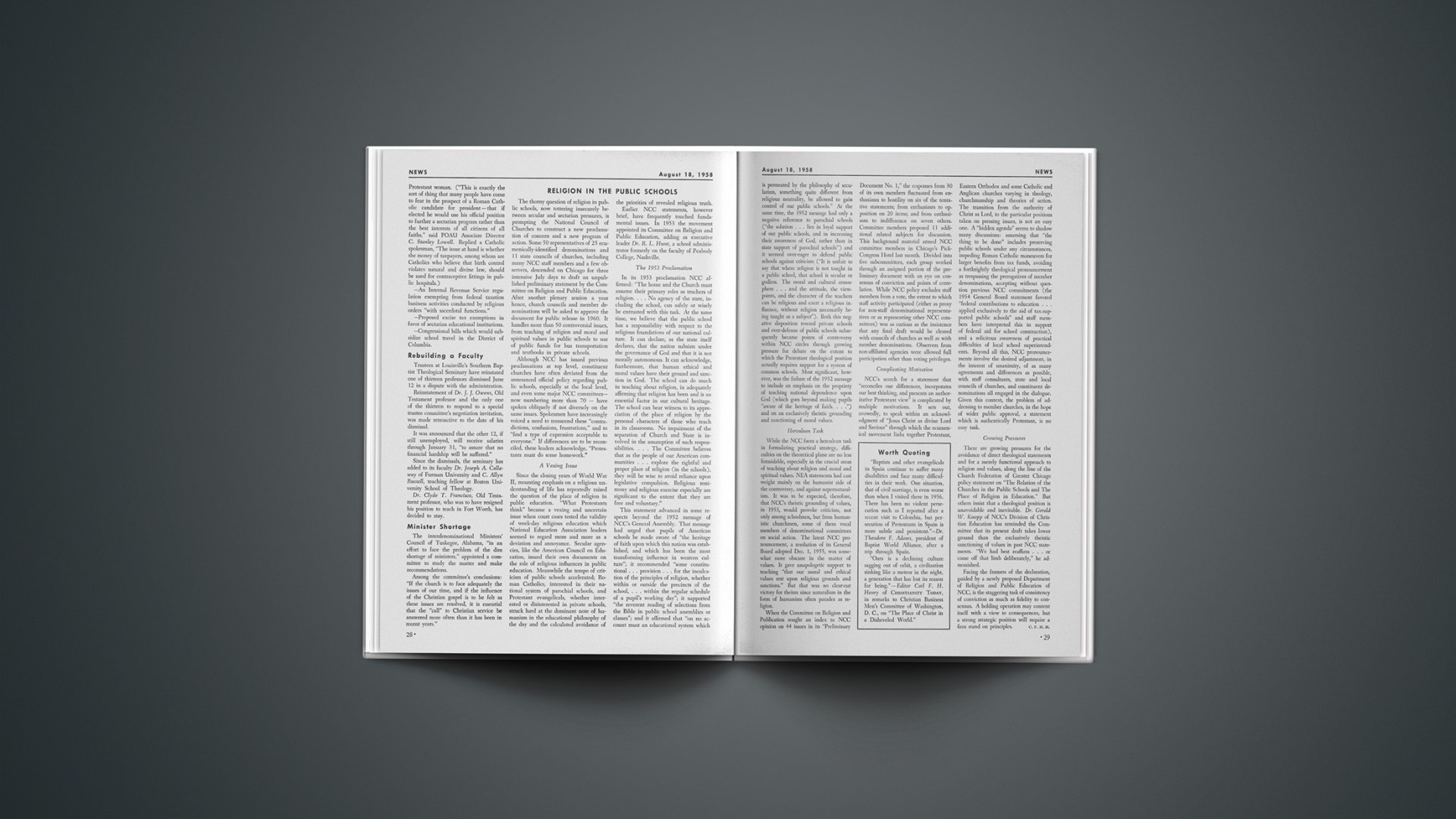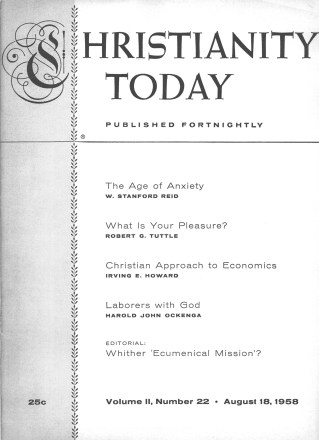The thorny question of religion in public schools, now tottering insecurely between secular and sectarian pressures, is prompting the National Council of Churches to construct a new proclamation of concern and a new program of action. Some 50 representatives of 25 ecumenically-identified denominations and 11 state councils of churches, including many NCC staff members and a few observers, descended on Chicago for three intensive July days to draft an unpublished preliminary statement by the Committee on Religion and Public Education. After another plenary session a year hence, church councils and member denominations will be asked to approve the document for public release in 1960. It handles more than 50 controversial issues, from teaching of religion and moral and spiritual values in public schools to use of public funds for bus transportation and textbooks in private schools.
Although NCC has issued previous proclamations at top level, constituent churches have often deviated from the announced official policy regarding public schools, especially at the local level, and even some major NCC committees—now numbering more than 70—have spoken obliquely if not diversely on the same issues. Spokesmen have increasingly voiced a need to transcend these “contradictions, confusions, frustrations,” and to “find a type of expression acceptable to everyone.” If differences are to be reconciled, these leaders acknowledge, “Protestants must do some homework.”
A Vexing Issue
Since the closing years of World War II, mounting emphasis on a religious understanding of life has repeatedly raised the question of the place of religion in public education. “What Protestants think” became a vexing and uncertain issue when court cases tested the validity of week-day religious education which National Education Association leaders seemed to regard more and more as a deviation and annoyance. Secular agencies, like the American Council on Education, issued their own documents on the role of religious influences in public education. Meanwhile the tempo of criticism of public schools accelerated; Roman Catholics, interested in their national system of parochial schools, and Protestant evangelicals, whether interested or disinterested in private schools, struck hard at the dominant note of humanism in the educational philosophy of the day and the calculated avoidance of the priorities of revealed religious truth.
Earlier NCC statements, however brief, have frequently touched fundamental issues. In 1953 the movement appointed its Committee on Religion and Public Education, adding as executive leader Dr. R. L. Hunt, a school administrator formerly on the faculty of Peabody College, Nashville.
The 1953 Proclamation
In its 1953 proclamation NCC affirmed: “The home and the Church must assume their primary roles as teachers of religion.… No agency of the state, including the school, can safely or wisely be entrusted with this task. At the same time, we believe that the public school has a responsibility with respect to the religious foundations of our national culture. It can declare, as the state itself declares, that the nation subsists under the governance of God and that it is not morally autonomous. It can acknowledge, furthermore, that human ethical and moral values have their ground and sanction in God. The school can do much in teaching about religion, in adequately affirming that religion has been and is an essential factor in our cultural heritage. The school can bear witness to its appreciation of the place of religion by the personal characters of those who teach in its classrooms. No impairment of the separation of Church and State is involved in the assumption of such responsibilities.… The Committee believes that as the people of our American communities … explore the rightful and proper place of religion (in the schools), they will be wise to avoid reliance upon legislative compulsion. Religious testimony and religious exercise especially are significant to the extent that they are free and voluntary.”
This statement advanced in some respects beyond the 1952 message of NCC’s General Assembly. That message had urged that pupils of American schools be made aware of “the heritage of faith upon which this nation was established, and which has been the most transforming influence in western culture”; it recommended “some constitutional … provision … for the inculcation of the principles of religion, whether within or outside the precincts of the school, … within the regular schedule of a pupil’s working day”; it supported “the reverent reading of selections from the Bible in public school assemblies or classes”; and it affirmed that “on no account must an educational system which is permeated by the philosophy of secularism, something quite different from religious neutrality, be allowed to gain control of our public schools.” At the same time, the 1952 message had only a negative reference to parochial schools (“the solution … lies in loyal support of our public schools, and in increasing their awareness of God, rather than in state support of parochial schools”) and it seemed over-eager to defend public schools against criticism (“It is unfair to say that where religion is not taught in a public school, that school is secular or godless. The moral and cultural atmosphere … and the attitude, the viewpoints, and the character of the teachers can be religious and exert a religious influence, without religion necessarily being taught as a subject”). Both this negative disposition toward private schools and over-defense of public schools subsequently became points of controversy within NCC circles through growing pressure for debate on the extent to which the Protestant theological position actually requires support for a system of common schools. Most significant, however, was the failure of the 1952 message to include an emphasis on the propriety of teaching national dependence upon God (which goes beyond making pupils “aware of the heritage of faith.…”) and on an exclusively theistic grounding and sanctioning of moral values.
Herculean Task
While the NCC faces a herculean task in formulating practical strategy, difficulties on the theoretical plane are no less formidable, especially in the crucial areas of teaching about religion and moral and spiritual values. NEA statements had cast weight mainly on the humanist side of the controversy, and against supernaturalism. It was to be expected, therefore, that NCC’s theistic grounding of values, in 1953, would provoke criticism, not only among schoolmen, but from humanistic churchmen, some of them vocal members of denominational committees on social action. The latest NCC pronouncement, a resolution of its General Board adopted Dec. 1, 1955, was somewhat more obscure in the matter of values. It gave unapologetic support to teaching “that our moral and ethical values rest upon religious grounds and sanctions.” But that was no clear-cut victory for theism since naturalism in the form of humanism often parades as religion.
When the Committee on Religion and Publication sought an index to NCC opinion on 44 issues in its “Preliminary Document No. 1,” the responses from 30 of its own members fluctuated from enthusiasm to hostility on six of the tentative statements; from enthusiasm to opposition on 20 items; and from enthusiasm to indifference on seven others. Committee members proposed 11 additional related subjects for discussion. This background material armed NCC committee members in Chicago’s Pick-Congress Hotel last month. Divided into five subcommittees, each group worked through an assigned portion of the preliminary document with an eye on consensus of conviction and points of correlation. While NCC policy excludes staff members from a vote, the extent to which staff activity participated (either as proxy for non-staff denominational representatives or as representing other NCC committees) was as curious as the insistence that any final draft would be cleared with councils of churches as well as with member denominations. Observers from non-affiliated agencies were allowed full participation other than voting privileges.
Complicating Motivation
NCC’s search for a statement that “reconciles our differences, incorporates our best thinking, and presents an authoritative Protestant view” is complicated by multiple motivations. It sets out, avowedly, to speak within an acknowledgment of “Jesus Christ as divine Lord and Saviour” through which the ecumenical movement links together Protestant, Eastern Orthodox and some Catholic and Anglican churches varying in theology, churchmanship and theories of action. The transition from the authority of Christ as Lord, to the particular positions taken on pressing issues, is not an easy one. A “hidden agenda” seems to shadow many discussions: assuming that “the thing to be done” includes preserving public schools under any circumstances, impeding Roman Catholic maneuvers for larger benefits from tax funds, avoiding a forthrightly theological pronouncement as trespassing the prerogatives of member denominations, accepting without question previous NCC commitments (the 1954 General Board statement favored “federal contributions to education … applied exclusively to the aid of tax-supported public schools” and staff members have interpreted this in support of federal aid for school construction), and a solicitous awareness of practical difficulties of local school superintendents. Beyond all this, NCC pronouncements involve the desired adjustment, in the interest of unanimity, of as many agreements and differences as possible, with staff consultants, state and local councils of churches, and constituent denominations all engaged in the dialogue. Given this context, the problem of addressing to member churches, in the hope of wider public approval, a statement which is authentically Protestant, is no easy task.
Worth Quoting
“Baptists and other evangelicals in Spain continue to suffer many disabilities and face many difficulties in their work. One situation, that of civil marriage, is even worse than when I visited there in 1956. There has been no violent persecution such as I reported after a recent visit to Colombia, but persecution of Protestants in Spain is more subtle and persistent.”—Dr. Theodore F. Adams, president of Baptist World Alliance, after a trip through Spain.
“Ours is a declining culture sagging out of orbit, a civilization sinking like a meteor in the night, a generation that has lost its reason for being.”—Editor Carl F. H. Henry of CHRISTIANITY TODAY, in remarks to Christian Business Men’s Committee of Washington,
D. C., on “The Place of Christ in a Disheveled World.”
Growing Pressures
There are growing pressures for the avoidance of direct theological statements and for a merely functional approach to religion and values, along the line of the Church Federation of Greater Chicago policy statement on “The Relation of the Churches in the Public Schools and The Place of Religion in Education.” But others insist that a theological position is unavoidable and inevitable. Dr. Gerald W. Knopp of NCC’s Division of Christian Education has reminded the Committee that its present draft takes lower ground than the exclusively theistic sanctioning of values in past NCC statements. “We had best reaffirm … or come off that limb deliberately,” he admonished.
Facing the framers of the declaration, guided by a newly proposed Department of Religion and Public Education of NCC, is the staggering task of consistency of conviction as much as fidelity to consensus. A holding operation may content itself with a view to consequences, but a strong strategic position will require a firm stand on principles.
C. F. H. H.










